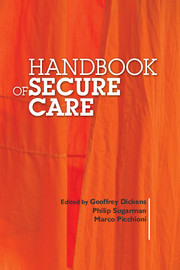Book contents
- Frontmatter
- Contents
- List of tables, boxes and figures
- List of contributors
- Preface
- 1 The evolution of secure and forensic mental healthcare
- 2 Mental disorder and offending
- 3 Clinical risk assessment in secure care
- 4 Risk management in secure care
- 5 Recovery in secure environments
- 6 Personality disorder
- 7 Women's mental health, aggression and offending
- 8 Offenders with intellectual disability in secure services and the criminal justice system
- 9 Secure mental healthcare for young people
- 10 Secure care for people with autism spectrum disorder
- 11 Acquired brain injury, trauma and aggression
- 12 Managing aggression and violence in older people
- 13 Firesetting in secure settings: theory, treatment and management
- 14 Specialist psychological treatment programmes in secure mental healthcare
- 15 Nursing in secure mental healthcare settings
- 16 Prescribing for specialist populations
- 17 Human rights in secure psychiatric care
- 18 Quality assurance and clinical audit in secure psychiatric care
- 19 Psychological support following violent assault and trauma: what works for staff in secure settings?
- Index
19 - Psychological support following violent assault and trauma: what works for staff in secure settings?
Published online by Cambridge University Press: 02 January 2018
- Frontmatter
- Contents
- List of tables, boxes and figures
- List of contributors
- Preface
- 1 The evolution of secure and forensic mental healthcare
- 2 Mental disorder and offending
- 3 Clinical risk assessment in secure care
- 4 Risk management in secure care
- 5 Recovery in secure environments
- 6 Personality disorder
- 7 Women's mental health, aggression and offending
- 8 Offenders with intellectual disability in secure services and the criminal justice system
- 9 Secure mental healthcare for young people
- 10 Secure care for people with autism spectrum disorder
- 11 Acquired brain injury, trauma and aggression
- 12 Managing aggression and violence in older people
- 13 Firesetting in secure settings: theory, treatment and management
- 14 Specialist psychological treatment programmes in secure mental healthcare
- 15 Nursing in secure mental healthcare settings
- 16 Prescribing for specialist populations
- 17 Human rights in secure psychiatric care
- 18 Quality assurance and clinical audit in secure psychiatric care
- 19 Psychological support following violent assault and trauma: what works for staff in secure settings?
- Index
Summary
Introduction
At the heart of quality healthcare for patients is the principle that an employing organisation should ensure appropriate support and care for its staff. This can pose significant challenges for services, including those providing secure care for people with mental disorder where there is increased risk of harm occurring to staff during their daily practice. In the UK, secure mental health services provide care for patients who have enduring serious mental health problems and a history of convictions and/or challenging behaviour. The Nursing in Secure Environments scoping study (United Kingdom Central Council for Nursing, Midwifery and Health Visiting, 1999) highlighted that patients’ mental disorder and offending patterns pose intense demands on nurses because they are required to maintain empathic relationships while also focusing on risk management, including the prevention and management of violence and aggression. Further, patients may expose staff to other behaviours that are potentially distressing, for example severe self-harm and accounts of traumatic abuse.
Research suggests that educational interventions can be effective in reducing some of the effects that working with potentially violent patients has on the therapeutic relationship. Dickinson & Hurley (2012) reviewed the literature and reported that staff working in secure environments often experience strong negative emotional reactions towards patients, which can lead to antipathy and alienation. They have suggested that educational programmes should be provided to promote the building of therapeutic alliances and to increase understanding. According to Howard et al (2009), training and support for staff may increase self-efficacy and thus reduce burnout. They have called for longitudinal research to increase understanding of the relationship between violence and burnout. A number of studies have recommended that staff in secure services should be provided with effective support structures (Kirby & Pollock, 1995; Coffey & Coleman, 2001; Mason, 2002).
Despite the acknowledgment of a need for support, there has been little clear guidance about implementing any specific support model. This chapter describes the development and content of a new support model (ASSIST) for staff working in secure mental health services and the support services based on that model. We describe the contextual factors underlying the need for the ASSIST model, including the nature and prevalence of aggression and violence against healthcare staff in mental health settings and specifically in secure care.
- Type
- Chapter
- Information
- Handbook of Secure Care , pp. 308 - 323Publisher: Royal College of PsychiatristsPrint publication year: 2015



